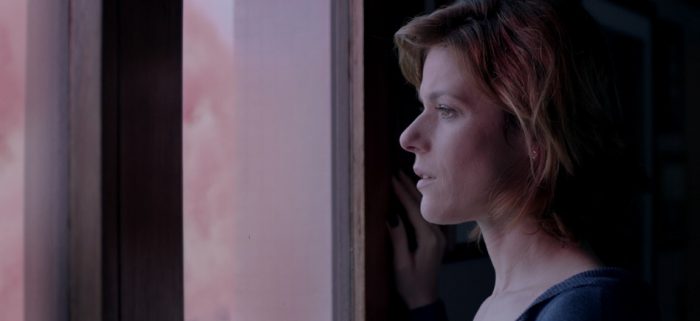Welcome to a world where people are stuck inside, quarantined against something deadly lurking beyond their doors and windows. No, it’s not the story of COVID-19 – it’s The Pink Cloud, a film shot in 2019, before many of us had any idea what the coronavirus even was; before the idea of self-quarantining for a long period of time became the new normal. Circumstances beyond the control of filmmaker Iuli Gerbase have made The Pink Cloud all the more unsettling, and even timely. But would the film have as much of an impact if we weren’t all about to enter a full year of quarantine?
After a night of partying and fun, practical strangers Giovana (Renata de Lélis) and Yago (Eduardo Mendonça) wake up to a shocking development: a gorgeous, ever-moving pink cloud has formed over the city, and it’s killing people. Anyone who steps outside while the pink cloud hovers about is doomed to die within seconds. Which means these two people have gone from a potential one-night stand to guaranteeing together.
As fate would have it, the pair were crashing at the sprawling, well-stocked house of Giovana’s mother, so they’re able to stretch out a little. But as the days, and weeks, and years stretch on, that becomes cold comfort. Writer-director Gerbase is skilled at creating the passage of time here, be it through quick montages or bits of info that get casually tossed off. We watch the years fly by as Giovana and Yago are stuck with each other, unable to escape. Giovana has video calls with her younger sister, who had the bad luck of getting stuck at a never-ending sleepover at her friends’ house. Yago has video calls of his own – with his ailing father, who is convinced his live-in nurse is trying to kill him.
And time ticks on. TV news coverage relies on cellphone footage – and, curiously enough, those interviewed end up growing accustomed to cloud. “No more robberies! No more kidnappings! No more car crashes!” one person cheerfully says. It’s as if the cloud has created a form of Stockholm syndrome, with people perfectly content to remain prisoners in their own homes.
Yago is one such person. While Giovana is constantly surfing the web and watching the TV looking for some sort of hopeful news, Yago is apparently perfectly content to remain quarantined forever. “If we stay locked in here for many years would you like kids?” he asks at one point as if that were the most normal question in the world.
Giovana does not want kids. She’s emphatic about that. In her mind, having kids would be giving up her freedom. But as Yago points out, her freedom is pretty much gone now anyway since she’s stuck inside with nowhere to go. And as time continues to crawl on, the pair do end up having a kid – a son (they have a video call with a doctor to oversee the home birth). But inevitability soon sets in, and Giovana grows weary of the relationship and insists on a breakup. Of course, this won’t be your standard breakup since the duo are still stuck in the same place. The solution: Yago will live upstairs, Giovana will live downstairs, and they’ll take turns raising their son.
The Pink Cloud is darkly humorous in the way it approaches all of this. The film is deliberately vague about the science of the cloud – where does it come from? Why won’t it go away? How does it kill people? There are no answers, and even if there were, the film wouldn’t be interested in them. Instead, it wants to explore how its characters deal with their situation, and how that situation slowly pushes them to the breaking point.
The two actors who take up the bulk of the screentime are equally believable and natural here. We fully buy into Mendonça’s take on the apathetic Yago just as much as we believe de Lélis as her Giovana grows more and more haggard and frustrated. We have sympathy for these two even when they do things that might otherwise make us loathe them. It’s to the actor’s credit that they carry the weight of all of this with seeming ease.
There are wonderful little details scattered throughout it all – news footage of people celebrating the cloud’s one-year birthday as if it were all a game; air-tight tubes that are attached to people’s homes via drones so the government can drop in supplies; comments like, “I hear it might go away in the winter…something about the weather,” and, “How come no one has a solution? A mask that allows us to go out?” When role-playing fails to spice up Giovana and Yago’s relationship and they split, the two turn to others for sexual gratification – be it Giovana peeping out her window at a neighbor or Yago having a full-blown long-distance relationship with another woman via the internet. The longer the cloud lingers, the darker the mood inside the home becomes. Soon, Giovana is trying to escape the house and her make-shift family via a VR headset.
The Pink Cloud is not about our current COVID-19 situation but the connections are inevitable at this point. The idea of being trapped in our houses has become commonplace by now and it will no doubt make Gerbase’s film uncomfortable for some. One still has to wonder if the film would be as effective right now if it weren’t for COVID. Without the pandemic, everything here would seem a tad fantastical. Now, we can’t help but draw sometimes painful connections. Perhaps it’ll hit too close to home. After all, the film makes it clear that there’s only so long a person can remain trapped before they start getting desperate.
/Film rating: 7 out of 10
The post ‘The Pink Cloud’ Review: A One-Night Stand Turns Into a Years-Long Quarantine [Sundance 2021] appeared first on /Film.
from /Film https://ift.tt/2L2v97F
via IFTTT

Comments
Post a Comment